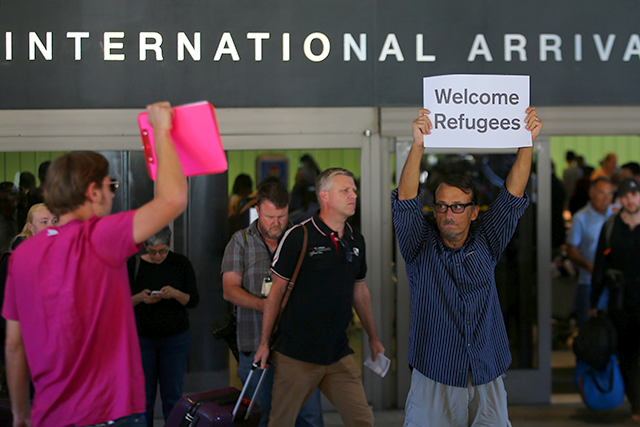A lot has been said about the policies and politics that affect refugee arrivals in the U.S. But according to Damir Utržan, a post-doctoral fellow at the University of Minnesota, there hasn’t been enough information about refugee resettlement agencies — the organizations responsible for resettling and supporting immigrants and refugees in America.
So to understand the effectiveness of those groups — as well as their interactions with supporters and opponents of refugee admissions — Utržan and two other researchers at the university recently released a report chronicling the history and services of the U.S. Refugee Resettlement Program (USRP).
The report, which surveyed more than 70 leaders of organizations nationwide, focuses on the resettlement of Syrian refugees and how today’s polarized political climate has created widespread opposition against immigrants and refugees.
USRP is a federal program that has for decades collaborated with many domestic and international agencies to provide refugees with resettlement services and assistance to integrate them into U.S. society.
Those services include housing and temporary cash assistance for paying rent and buying food. The organizations also connect refugees to health care, job training and education services in an effort to help them become self-sufficient.
Though the U.S. has long admitted the largest number of refugees in the world, there has been a growing opposition to such resettlements, especially those coming from predominantly Muslim countries. That has impacted resettlement agencies nationwide in different ways. Despite millions of displaced Syrian refugees around the world, for example, leaders of resettlement organizations reported that the expected rise in the number of refugees coming to the U.S. didn’t materialize, largely due to the restrictive immigration policies of the Trump administration.
Even so, resettlement organizations were concerned about finding adequate housing for Syrian refugees, since they’re more likely to boast larger household sizes. While 43 percent of the leaders surveyed in the reported noted that they were “moderately” prepared to handle the influx of Syrian refugees, 21 reported they were “extremely” prepared and 19 percent said they weren’t prepared.

When it came to those who actively support resettlement agencies, leaders reported that 53 percent of the supporters were civic leaders, 39 percent were elected officials and the rest included religious institutions and advocacy groups. The study also found that the majority of the leaders of resettlement organizations are white women.
Most striking, the majority of the leaders of those organization reported that they are either unsure or concerned they won’t able to continue funding existing resettlement programs in the foreseeable future.
In addition, half of the resettlement organization leaders surveyed reported that members of their community opposed resettlement of refugees into their neighborhoods for various reasons. Some members didn’t want refugee for pure discrimination against foreigners; some were concerned about terrorism; and others were concerned that refugees would take away jobs.
To make their opposition known, the report states, these members called the organizations, contacted their city or state representatives, wrote letters in local newspapers or called-in radio talk shows.
While the report doesn’t detail information on refugee resettlement organizations in Minnesota, it did talk to national agencies that have close partnerships with major resettlement organizations in the state. Since 2015, according to the Minnesota Department of Human Services, there have only been 49 refugees from Syria resettled in Minnesota. That’s mainly because resettlement organizations tend to place Syrians where there’s an already established community of their own — places like Texas and Michigan.

